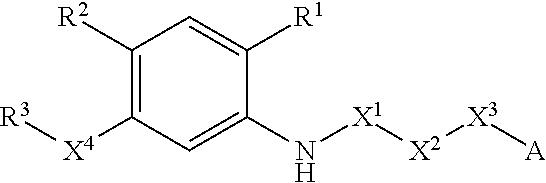N-acyl anthranilic acid derivative or salt thereof
a technology of nacyl anthranilic acid and derivative, which is applied in the direction of heterocyclic compound active ingredients, drug compositions, dermatological disorders, etc., can solve the problems of poor prognosis of disease, poor safety and kinetics, and fibrosis, and achieve excellent safety and kinetics, prevention, treatment, and
- Summary
- Abstract
- Description
- Claims
- Application Information
AI Technical Summary
Benefits of technology
Problems solved by technology
Method used
Image
Examples
reference example 1a
[0317]
[0318]Pyridine (0.034 mL) and acetic anhydride (0.034 mL) were sequentially added to a methylene chloride (0.54 mL) solution of 5-tert-butylsalicylic acid (0.054 g), followed by stirring at room temperature for 2 hours. The solvent was evaporated under reduced pressure, and 1 mol / L hydrochloric acid and ethyl acetate were added to the residue. The organic layer was separated, washed with a saturated aqueous solution of sodium chloride, and dried over anhydrous magnesium sulfate, and the solvent was evaporated under reduced pressure. The obtained residue was purified by silica gel column chromatography [eluent: 100-90% chloroform / methanol] to obtain 0.049 g of 2-acetoxy-5-tert-butylbenzoic acid as a white solid.
[0319]1H-NMR (CDCl3) δ: 1.35 (9H, s), 2.35 (3H, s), 7.06 (1H, d, J=8.3 Hz), 7.63 (1H, dd, J=8.3, 2.4 Hz), 8.12 (1H, d, J=2.4 Hz).
reference examples 2a to 4a
[0320]As in Reference Example 1a, the compounds shown in Table 5a were prepared.
TABLE 5aReferenceExample No.2a3a4a
2-Acetoxy-5-ethoxybenzoic acid
[0321]1H-NMR (DMSO-d6) δ: 1.33 (3H, t, J=7.0 Hz), 2.21 (3H, s), 4.06 (2H, q, J=7.0 Hz), 7.09 (1H, d, J=8.8 Hz), 7.17 (1H, dd, J=8.8, 3.2 Hz), 7.37 (1H, d, J=3.2 Hz), 13.06-13.16 (1H, broad).
2-Acetoxy-5-isopropoxybenzoic acid
[0322]1H-NMR (DMSO-d6) δ: 1.27 (6H, d, J=6.1 Hz), 2.21 (3H, s), 4.56-4.68 (1H, m), 7.08 (1H, d, J=8.8 Hz), 7.16 (1H, dd, J=8.8, 2.9 Hz), 7.35 (1H, d, J=2.8 Hz).
2-acetoxy-5-acetylbenzoic acid
[0323]1H-NMR (CDCl3) δ: 2.38 (3H, s), 2.66 (3H, s), 7.26 (1H, d, J=8.6 Hz), 8.23 (1H, dd, J=8.6, 2.2 Hz), 8.69 (1H, d, J=2.2 Hz).
reference example 5a
[0324]
[0325]As in Reference Example 1a, the following compound was prepared.
5-Acetoxy-2-(benzyloxy)benzoic acid
[0326]1H-NMR (CDCl3) δ: 2.30 (3H, s), 5.29 (2H, s), 7.13 (1H, d, J=8.9 Hz), 7.30 (1H, dd, J=8.9, 3.0 Hz), 7.38-7.48 (5H, m), 7.91 (1H, d, J=3.0 Hz), 10.60-10.95 (1H, m).
PUM
| Property | Measurement | Unit |
|---|---|---|
| Volume | aaaaa | aaaaa |
| Mass | aaaaa | aaaaa |
| Mass | aaaaa | aaaaa |
Abstract
Description
Claims
Application Information
 Login to View More
Login to View More - R&D
- Intellectual Property
- Life Sciences
- Materials
- Tech Scout
- Unparalleled Data Quality
- Higher Quality Content
- 60% Fewer Hallucinations
Browse by: Latest US Patents, China's latest patents, Technical Efficacy Thesaurus, Application Domain, Technology Topic, Popular Technical Reports.
© 2025 PatSnap. All rights reserved.Legal|Privacy policy|Modern Slavery Act Transparency Statement|Sitemap|About US| Contact US: help@patsnap.com



